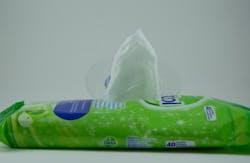CARY, NC, MARCH 26, 2020 -- Washington Representative Joe Fitzgibbon (D-34) joined the Association of Washington Cities and INDA, Association of the Nonwoven Fabrics Industry, in applauding Washington Gov. Inslee's signing of HB 2565, a law intended to address the labeling of certain disposable wipes.
The law, spearheaded by Rep. Fitzgibbon, Chairman of the Washington House Environment and Energy Committee, represents a months-long cooperative effort between a coalition of Washington wastewater and municipal sector stakeholders led by the Association of Washington Cities and INDA, the trade association representing the wipes industry. The groups came together to tackle the problem of consumers flushing baby wipes, surface cleaning wipes and other "nonflushable" wipes that are not designed to be disposed in sewer systems. The law requires packages of these wipes to carry prominent "Do Not Flush" labeling to help guide consumers to dispose of them appropriately in the trash.
"I introduced this legislation in response to concerns voiced by Washington sewer system operators that consumers are flushing certain categories of wipes that are not intended to be," said Representative Fitzgibbon. "I was pleased to sponsor legislation that brought together municipalities and industry to find a common sense solution to this problem and am proud that Washington is the first state in the nation to tackle this issue in a meaningful way."
"Improperly flushed wipes can be a contributing cause to sewer clogs and wastewater spills," said Peter King, CEO of the Association of Washington Cities. "This bill was a collaborative effort between government and industry, which will provide consumers with clear disposal direction and protect the public's sewer and wastewater systems."
"Baby wipes, cosmetic wipes and other disposable wipes provide tangible benefits to consumers, while hard surface antibacterial and disinfecting wipes are an indispensable tool for household cleaning and reducing exposure to viruses impacting public health as we've seen recently. However, unlike wipes labeled "flushable," these kinds of wipes were not designed nor marketed to be disposed in the toilet," said INDA's President Dave Rousse. "We would like to thank Representative Fitzgibbon for his leadership and the Washington cities and wastewater community for their constructive engagement on legislation that will go a long way to ensuring that consumers understand which wipes are 'Do Not Flush' and require disposal in the trash can."
Learn more at www.responsibleflushingalliance.com.



